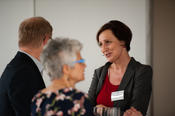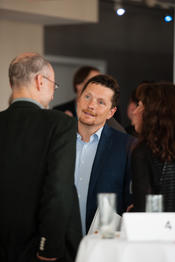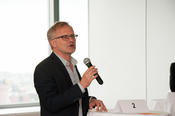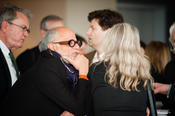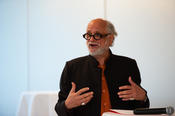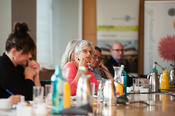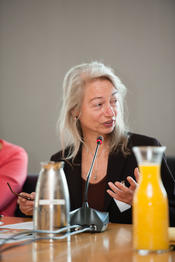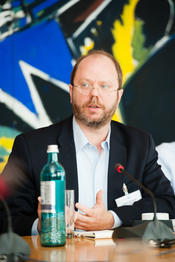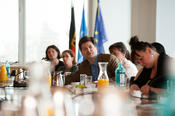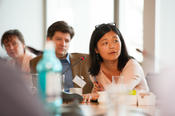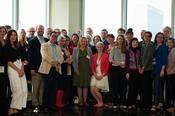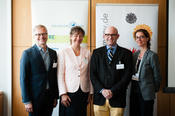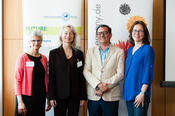Conference Report & Impressions
At the conference "Humanities - What's Next?" in New York with former visiting researchers from Freie Universität, the main focus was on current research topics and the role of the humanities at universities and in society.
While midtown Manhattan was immersed in warm evening light and the street traffic continued to roar tirelessly 23 floors below, Homi K. Bhabha was speaking on the top floor of the New Yorker German House. The cultural theorist from Harvard University discussed questions that humanities scholars ask themselves these days: How can representatives from these disciplines react to current global crises? What kind of social relevance do humanities have today?
Homi Bhabha’s keynote marked the beginning of the two-day conference “Humanities – What’s Next?” which former visiting researchers from the USA and their colleagues at Freie Universität were invited to attend. At the conference, this topic was discussed from both American and German perspectives. The event was organized by the Alumni Office of Freie Universität within the scope of the Research Alumni Program with support from the Alexander von Humboldt Foundation. As host, the liaison office of Freie Universität in the German House with a view of the main building of the United Nations offered an ideal setting for transatlantic exchange.
Homi Bhabha, himself a research alumnus of Freie Universität who continues to be closely associated with the university through the awarding of an honorary doctorate and his membership in the international advisory boards of both the Graduate School of North American Studies and the international research college Interweaving Performance Cultures, reminded everyone that humanities cannot just remain witness to societal and political processes. Indeed, they must formulate answers in the areas in which other disciplines reach their theoretical and methodological limits. These “blind spots” are a challenge for the humanities, which Bhabha illustrated with the current discourse on worldwide migration-related issues. Legal scholars and political scientists are often consulted in these cases, but the perspective of the humanities is important in order to gain a comprehensive understanding of the problems. Here, researchers in the humanities disciplines need to redefine how they perceive their work.
In a round-table discussion, the roughly 40 participants reinforced the belief that the humanities are not currently in a crisis, but are being called upon in new ways. Interdisciplinarity also plays an increasingly greater role in the humanities, as societal and technical changes result in new questions, but also opportunities for cooperation. Fields such as medicine or informatics provide alternative theoretical and methodological approaches and create new fields of research such as medical humanitiesor digital humanities. Interdisciplinarity needs to be about a mutual exchange: The humanities must not only be open, but need to find their way into other disciplines, encouraged Irene Kacandes, the Dartmouth Professor of German Studies and Comparative Literature at Dartmouth University. Several participants voiced their concerns that that might be accompanied by a “watering down” of one’s own academic aspirations.
Numerous humanities scholars have experienced that, more than ever, the humanities have to defend not only their methodological orientation, but also their value in universities and society. At both American and German universities, their fields face increasing economic pressure and a monetization of relevance. Noah Isenberg, Professor of Culture and Media at the New School in New York City, postulated that within the societal context, the humanities are increasingly being confronted with anti-intellectualism.
An intense discussion then ensued on how humanities scholars could more strongly enter into dialogue with the general public in order to develop awareness for the significance of the fields and to demonstrate relevance. Stepping out of the ivory tower is important; however, often that means a balancing act between academic aspirations and simplification. As each scholar has to find his or her own way in this regard, forums like this conference are important for exchanging experiences and formulating joint positions.
In addition to discussing various issues, the conference also aimed to expand the network and provide information about concrete funding formats at Freie Universität as well as the opportunities for research stays in Germany with support from the German Academic Exchange Service (DAAD), the German Research Foundation (DFG), or the Alexander von Humboldt Foundation. Franca Brand, Head of the Alumni Office and Coordinator of the Research Alumni Program at Freie Universität, encouraged researchers to take advantage of what the programs have to offer. Also, the representatives of the German Academic Exchange Service, the German Research Foundation, and the Alexander von Humboldt Foundation had an attentive audience when they talked about current funding opportunities for humanities scholars and research stays in Germany. To conclude the meeting, Herbert Grieshop, the director of International Affairs at Freie Universität, provided an overview of the internationalization strategy of Freie Universität, in which he emphasized the importance of transatlantic academic collaboration – especially in times of global crises – and the key role that visiting researchers will still have in the future for the international networks of Freie Universität.
The conference “Humanities – What’s Next?“ was funded through the “Research Alumni Strategies” contest of the Alexander von Humboldt Foundation and is part of the Research Alumni Program of the Freie Universität.
The meeting is a constituent part of the collaborative project "International Research Marketing" which is a joint initiative by the Alexander von Humboldt Foundation, the German Academic Exchange Service, the Deutsche Forschungsgemeinschaft, and the Fraunhofer-Gesellschaft. All the activities within the project are part of the "Promote Innovation and Research in Germany" initiative under its brand "Research in Germany”. The initiative is funded by the German Federal Ministry of Education and Research. More information can be found under: www.research-in-germany.org and www.forscher-alumni.de.
With its Research Alumni Program, Freie Universität has intensified its outreach to former guest researchers in order to strengthen international research networks. To ensure the sustainability of these networks, the program offers funding for junior researchers from the teams of Freie Universität hosts and Research Alumni.
Further information
Franca Brand, Freie Universität Berlin, Division of International Affairs, Research Alumni Program Coordinator, Telephone: +49-30-838-73801, E-Mail: alumni@fu-berlin.de, www.fu-berlin.de/alumni
Press release Nr. 334/2016 from 10.11.2016 “Grant for Research Alumni Meeting abroad“


